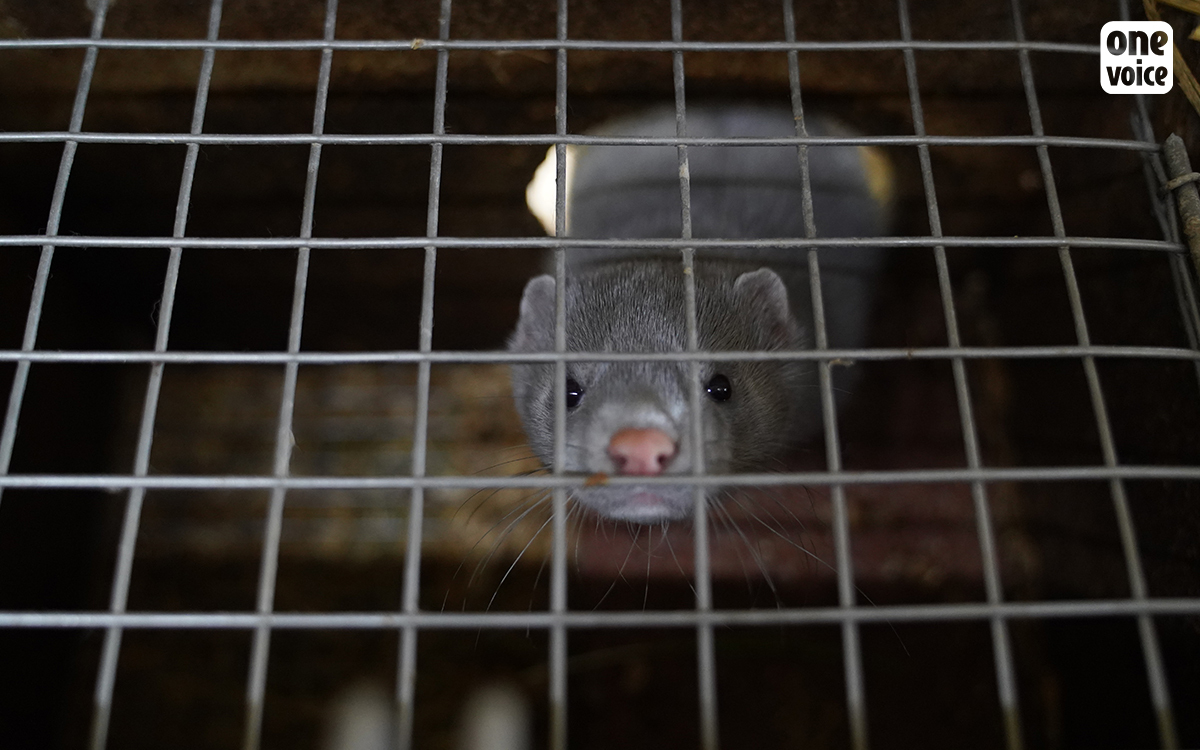
Covid-19 on mink farms: an absolute massacre
All the animals on mink farms in Denmark are to be killed, this time not in the name of fashion but of public health. Stop this deadly industry!
Mink on fur farms are spreading SARS-CoV-2 and playing a part in the worrying mutation of the virus. The large-scale slaughter has begun. Denmark, in particular, has decided to gas all its animals as soon as possible. With cases of infection increasing exponentially we are asking our government not to wait until the last minute before taking the problem in hand and to close down the last four French fur farms in order to bring the horror to an end.
It’s a bloodbath. Denmark, with its 1137 fur farms the world’s leading producer of mink pelts, announced, on Wednesday 4 November, the “total destruction” of its “stock”. That means between 15 and 17 million animals will be gassed. The massacre has already begun because tens of thousands of mink were slaughtered at the beginning of the Summer as soon as the first cases of animals with SARS-CoV-2 had been identified on three farms in the north of Jutland. Since then the epidemic has continued to spread on farms in that region and “measures” to try to contain it have intensified: more and more animals, both sick and healthy, have been killed in all the establishments infected by Covid-19 and those within a radius of 7.8 kilometres.
There won’t be a single one left
On Wednesday 4 November Denmark changed up a gear: all mink were to be killed as quickly as possible “as a precautionary measure”. This was a radical decision that the Prime Minister, Mette Frederiksen, justified at a press conference by explaining that the virus had mutated in those animals and had been transmitted to twelve people, with reduced sensitivity to the antibodies. Against this background she said she feared that the development of vaccines worldwide would become much less effective or even useless.
Ils auraient dû être gazés pour la vanité de l’industrie de la mode, ils l’ont été pour cause de #COVID19… Au Danemark, la réalité crue des élevages de visons pour la fourrure s’étale sous nos yeux: des milliers de cadavres, des vies annihilées. L’horreur totale! #StopFourrure pic.twitter.com/TgsLxSz4wB
— One Voice (@onevoiceanimal) November 2, 2020
An international problem
Although the tragedy unfolding in Denmark has hit the headlines because of its scale, it is not the first. Since the beginning of the pandemic numerous countries in Europe, including outside the European Union, have been faced with the problem of the spread of SARS-CoV-2 in farmed mink, probably infected by people coming into contact with them in the course of their work. The first cases were detected in the Netherlands as early as April 2020. And there too drastic measures were taken to counter it, with 2,723,904 mink being killed. At the same time the USA, Spain, Sweden and Italy also recorded their toll of sick and dead animals, often resulting in a policy of slaughter.
And in France?
It can’t go on! Faced with the extent of this mass slaughter we can’t just sit back and do nothing! Will the images of corpses heaped up by the million at least make the public and governments aware of the horror of the fur industry? These unfortunate mink were in any case sentenced to die sooner or later in the same ignoble way and to end up transformed into coat collars or other clothing. We shall continue to denounce the ordeal inflicted on these animals, sacrificed for the whims of the type of fashion that has no conscience. We have conducted repeated investigations, the last of which goes back to August, in support. The urgency of the health situation on the borders of France today cannot be overstated. Will this argument accelerate awareness? We are counting on the State to arrange for tests to be carried out and for these establishments to be closed down immediately. Both public health and ethics ordain that not even one more mink should be born in France.
Translated by Patricia Fairey